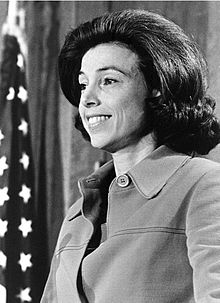The US-China 100 Day Action Plan and U.S. National Committee on United States China Relations
Frank Sep. 17, 2017, in Waterloo, Ontario
April 6, 2017, at 5 pm, in
the parking place of Sea
Lake Manor, Trump and his wife Melania warmly welcome Xi Jinping and wife
Peng Liyuan.
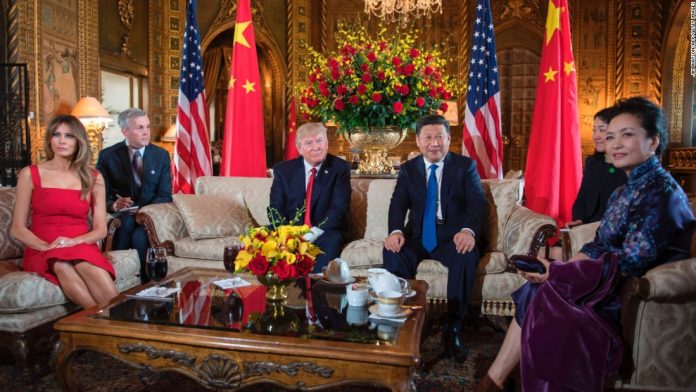

Later, as an important outcome of the visit, in consideration of
the threat of Sino-US trade war that initially claimed by President Trumpe, Xi
Jinping proposed the
US-China 100 Day Action Plan by negotiations to find a way to reduce the US
trade deficit with China and avoid a foolish trade war.
CCTV dialogue program The new voyage of Sino - US
trade on YouTube invites some key figures that may involve in the trade talks;
especially, there two key figures of U.S. side were from the U.S.’s National Committee on United States–China Relations, they
are
Stephen Orlins the President of the National Committee on United States-China Relations since
May 1, 2005. And Carla Anderson Hills the Chairlady of the National Committee on United States-China Relations.
From the point of view in dialogue,
the staff of both sides are very rational, the root causes of trade disputes
between the two countries was not at the technical level; but from politics, it
was the ignorance of the American politician.
Follow was reproduced information
regarding the U.S. national committee and its president and Chairlady.
Mission[edit]
For more than fifty years, the National Committee has been at the forefront in building a foundation of mutual trust and collaboration between the United States and China by conducting exchange, educational and policy activities in areas of politics and security, education, governance and civil society, economic cooperation, media and transnational issues, addressing these issues with respect to mainland China, Hong Kong and Taiwan.
National Committee exchanges and conferences bring together leaders in their fields from both sides of the Pacific, and promote intellectual dialogue, productive engagement, and informed decision-making across a range of disciplines.
The committee’s membership consists of Americans from all parts of the country, in addition to corporations and professional firms. They represent many viewpoints, but share the belief that productive U.S.-China relations require ongoing public education, face-to-face contact and forthright exchange of ideas.
Activities[edit]
The National Committee promotes mutual understanding and constructive relations through programs in four primary categories:
Informing policy makers and opinion shapers through exchanges that enable elected officials, government leaders and senior military personnel to meet, develop working relationships and discuss critical issues. Activities include:
- Events for visiting Chinese leaders (including Presidents Xi Jinping and Hu Jintao, and Premier Wen Jiabao) to interact with the American public, media and business leaders
- Congressional member and staff delegations to China to expose legislators and their aides to China and connect them with Chinese counterparts
- Senior military officers briefings and annual trip to China to learn about non-military aspects of the country
Fostering Dialogue and cooperation on cutting edge issues to promote frank exchanges among experts and policy leaders. These Track II dialogues include:
- U.S.-China Economic Dialogue: A semi-annual meeting of experts from both countries for discussion and development of policy recommendations
- Strategic Security Dialogue: Military, political and academic specialists discuss critical security issues in Asia
- Energy Dialogue: Former government officials, industry experts and academics from the United States and China seek new areas for energy and climate change cooperation
- Dialogue on Human Rights and Rule of Law: An annual meeting convened by the National Committee and the China Foundation for Human Rights to promote high-level exchange and discussion of law and human rights issues in the United States and China
- Dialogue on Maritime Issues & International Law: This ongoing dialogue—the first of its kind—was established in 2012 to convene American and Chinese legal experts to explore recent maritime disputes and suggest possible solutions
Next generation programs to develop the capacity of future leaders from the United States and China. Initiatives include:
- Public Intellectuals Program: Trains emerging American experts on China to engage with the policy community, the media and the public
- Student Leaders Exchange: Intensive study tours for nationally recognized student leaders
- Young Leaders Forum: Convenes next-generation leaders in multiple fields from the two countries to learn from one another and foster personal and professional relationships
- Professional Fellows Program: Capacity building and two-way exchange for emerging leaders in China, Mongolia and the United States in the fields of environment, philanthropy, legal aid and community building for marginalized populations
Education:Facilitating the exchange of ideas through public outreach and educational exchanges, including:
- CHINA Town Hall: Local Connections, National Reflections: A simultaneous 75-city nationwide program to educate the public and policy makers about Sino-American relations
- Leaders Speak Series: Former cabinet secretaries discuss key issues in the U.S.-China relationship
- Public Lecture Series: Leading experts and authors share insights on China and its relations with the United States and the world; all program videos are posted online for public viewing
Key Programs[edit]
Some of the National Committee’s many current programs include:
CHINA Town Hall: Local Connections, National Reflections is 75-city nationwide program to help Americans learn about and discuss the U.S.-China relationship with leading experts. National webcast speakers have included Jon M. Huntsman, Jr., Jimmy Carter, Madeleine Albright, Zbigniew Brzezinski, Henry Kissinger and Gary Locke.
U.S. Congress Briefings and Delegations to China: In the belief that mutual understanding between Chinese and American policy makers is essential for a productive relationship, the National Committee sends regular delegations of Congressional members and senior staff to China. These trips provide opportunities to interact with policy leaders and gain a more informed perspective of China’s society and people. The National Committee also organizes briefings on China for incoming members of Congress with experts who have included Madeleine Albright and Dr. Henry Kissinger.
The Public Intellectuals Program is a two-year fellowship that encourages emerging American scholars and experts on China and U.S.-China relations to extend their work beyond academia, engage with the public and policy community, and strengthen links with specialists, opinion leaders and the community. Fellows are encouraged to actively deploy their knowledge to inform policy formation and to educate the public about Sino-American relations.
Track II Dialogues provide opportunities for influential policy professionals and leading experts to openly discuss critical issues in the U.S.-China relationship and reach consensus on potential solutions, which are then shared with their respective governments. The National Committee conducts regular dialogues, in the United States and China, on economic relations (now in its ninth year), maritime and security issues, energy cooperation, and rule of law and human rights.
New Neighbors: Chinese Investment in the United States by Congressional District is a first-of-its-kind study of Chinese foreign direct investment (FDI) in the United States. Providing cumulative investments values, numbers of operations, and jobs provision by region, state, and each of the 435 U.S. congressional districts, the study discusses investment trends and identifies areas of the U.S. economy with potential to attract additional Chinese investment.
Young Leaders Forum is an annual gathering for a select group of exceptional American and Chinese young professionals drawn from all segments of the two societies. Under-40-year-old business, finance, non-profit, and technology leaders from both countries come together and exchange points of view with counterparts from the arts, academia, and national and local government, to name just a few. Through off-the-record dialogue and group activities, participants explore substantive issues, develop enduring friendships, and increased their understanding of one another.
Origins of the National Committee[edit]
The National Committee on United States–China Relations was founded in June 1966 by a coalition of academic, civic, religious, and business leaders. The founders included some of the giants of the China field such as Robert A. Scalapino, A. Doak Barnett, Alexander Eckstein, Lucian Pye and Cecil Thomas, who became its first Executive Director. Their aim was to build a network of accomplished, credible individuals from a broad political spectrum, committed to open discussion and debate and to improving U.S. policy toward China. The Committee’s mission was explicitly to educate the U.S. public, but it quickly had opportunities to offer information and advice to President Lyndon B. Johnson and other political leaders, and by 1972 was in a position to co-host (along with the U.S. Table TennisAssociation) the Chinese Ping Pong team’s famous tour of the United States, an event that captured world attention and was covered by major newspapers and television networks.
The National Committee was founded in the wake of two groundbreaking conferences on U.S.-China policy held in 1964 and 1965. A one-day “Institute on China Today” held at University of California–Berkeley in 1964, and a “National Conference on the United States and China” in Washington, D.C. in 1965 helped lift an unofficial ban on public debate about China policy and gave a common platform to leaders from many sectors to reshape the U.S. approach towards China. At the time U.S. presidents wanted to move closer to normalization of relations with China but faced resistance in Congress. By privately advising Johnson in 1968 and Nixon in 1970, members of the National Committee played a vital role in the move towards normalization of relations.
Programs: 1970s to 1990s[edit]
During the years leading up to normalization of relations in 1979, the National Committee encouraged thoughtful discussion about China policy among Americans. The founders also believed that direct dialogue between Americans and Chinese would lead to improved understanding and productive relations, which would in turn enhance academic and business cooperation. Exchange programs, tours with Congressional leaders, and hosting events with visiting Chinese officials has been part of the Committee’s work since its earliest days.
The National Committee became the principal organization conducting public policy and other exchanges between China and the United States, and helped to shift U.S. policy and public opinion during the years leading up to the reopening of diplomatic relations in 1979.
In the 1980s the Committee expanded its work beyond its 1970s exchanges in civic affairs, education, performing arts, and athletics to a variety of fields, promoting sustained interchange between influential Chinese and Americans in governance, the media, urban planning, international relations, and economic planning and management. In the mid-1980s, the National Committee established the first formal, ongoing Track II (unofficial) discussion, the U.S.-China Dialogue, an off-the-record gathering of leading citizens of China and America; it was held another ten times before coming to an end in 2002.
While continuing its past programs of the past, during the 1990s, the National Committee focused on rule of law, legislative affairs and the expansion of civil society in China. These programs included regular exchanges of city mayors and municipal and provincial leaders, with an emphasis on urban planning, infrastructure development, sustainable development and related environmental concerns; programs in judicial training and exchanges of senior judges, including a 1996 trip to China by U.S. supreme court justiceAnthony M. Kennedy; and exchanges and programs focused on banking and economic policy development, journalism, NGO and foundation development, human rights, public health and economic development.
Programs from 2000-present: evolving role in global cooperation[edit]
Beginning in the 2000s, the National Committee expanded its range with several initiatives that included: The Diplomat Orientation Program, a study-tour providing a firsthand overview of American society, history and politics to Chinese officials and consular officers. A series of in-depth briefings on China for U.S. military officers is designed to broaden their understanding of China's culture, society, and politics, to enhance their dealings in the region. And the Teachers Exchange Program (1996-2014), which provided full academic-year opportunities for Chinese (K–12) teachers to teach in the United States and American teachers to teach in China.
The National Committee also developed a 2005 program on community planning for HIV/AIDS prevention and treatment; a ground-breaking visit to the United States by the chairman of the China Foundation for Human Rights Development; a program to help the reform of labor law in China under the U.S.-China Labor Law Cooperation Project; a 2009 Land Use and Public Participation Program that addressed rights and ownership issues in land development; and the Museum and Educational Outreach program, to bring progressive educational methods to prominent museums in China.
The National Committee also expanded its public education programs, and now regularly provides timely information directly from leading specialists on major issues of the U.S.-China relationship through seminars, panel programs, publications, e-mail briefings and conference calls.
Past and Current Leadership[edit]
The National Committee is a network of Americans from all parts of the country as well as corporations and professional firms. They bring many different perspectives on issues and priorities in U.S.-China relations, but share a commitment to ongoing public education and the enabling of face-to-face contact. Members of the Committee and its board of directors include many distinguished citizens: former secretaries of state Madeleine K. Albright, Henry A. Kissinger, and Condoleezza Rice and other former Cabinet secretaries; all of the former American ambassadors to China; leading scholars of the past several decades such as Jerome A. Cohen, Harry Harding, David Lampton, Nicholas Lardy, Kenneth Lieberthal, Susan Shirk, and Ezra Vogel; and Maurice R. Greenberg and many other corporate executives interested in China. The National Committee's current President is Stephen A. Orlins.
The National Committee has long benefited from the experience and expertise of its staff leadership. President Stephen A. Orlins speaks fluent Mandarin and was a member of the State Department legal team that created the framework for the historic opening in 1979. He has also served as president of Lehman Brothers Asia and as managing director of Carlyle Asia. Former presidents and executive directors John Holden, David M. Lampton, Arthur Rosen, and Preston Schoyer also had extensive China experience. Vice president Jan Berris has been with the National Committee since 1971 and has managed and led hundreds of delegations between the United States and China, including the 1972 Chinese Ping Pong Team visit—the first PRC group to set foot in the United States. The Committee has had a long line of distinguished chairpersons whose prestige and influence has been of great help to the organization; the latest is The Honorable Carla Hills, former Secretary of Housing and Urban Development and U.S. Trade Representative.
Board of directors[edit]
Stephen Orlins - Wikipedia Stephen A. Orlins (1 January, 1950 - ) has been President of the National Committee on United States-China Relations[1] since May 1, 2005. Prior to becoming president, Mr. Orlins was the managing director of Carlyle Asia, one of Asia’s largest (USD 750M) private equity funds. Since its founding in 1999, he has been and remains the chairman of the Board of Taiwan Broadband Communications (TBC). TBC is now one of the three largest cable television companies in Taiwan with over 640,000 subscribers. Prior to joining Carlyle, Mr. Orlins was a senior advisor to AEA Investors Inc., a New York based leveraged buyout firm, with responsibility for AEA’s business activities throughout Asia.
From 1983 to 1991, Mr. Orlins was with the investment banking firm of Lehman Brothers where he was a Managing Director from 1985 to 1991. From 1987 to 1990, he served as President of Lehman Brothers Asia. Based in Hong Kong, he supervised over 150 professionals with offices in Hong Kong, Korea, China, Taiwan, Thailand, Manila and Singapore. Prior to joining Lehman Brothers, Mr. Orlins practiced law with Coudert Brothers and Paul, Weiss, Rifkind, Wharton & Garrison in New York, Hong Kong and Beijing.
From 1976 to 1979, Mr. Orlins served in the Office of the Legal Advisor of the United States Department of State, first in the Office of the Assistant Legal Advisor for Political-Military Affairs and then for East Asian and Pacific Affairs. While in that office, he was a member of the legal team that helped establish diplomatic relations with the People’s Republic of China.
Born Carla Anderson in Los Angeles, she received her B.A. degree from Stanford University, after studying at St Hilda's College, Oxford. She earned her LL.B. degree from Yale Law School in 1958 and married Roderick M. Hills the same year.[2]
Hills was admitted to the California bar in 1959, and served as an Assistant United States Attorney in Los Angeles from 1959 to 1961. From 1962 to 1974, she was a partner at Munger, Tolles, Hills, and Rickershauser in Los Angeles. In 1972, she was an adjunct professor at UCLA.[3] An authority on federal practice and anti-trust law, Mrs. Hills wrote of Federal Civil Practice and Antitrust Advisor.[4] She is a former president of the National Association of Women Lawyers.
She was a United States Assistant Attorney General heading the Civil Division of the U.S. Department of Justice before being named as the secretary of the Department of Housing and Urban Development. Elliot L. Richardson sought to appoint her as assistant U.S. Attorney General in 1973, but he resigned shortly thereafter during the Watergate scandal. The offer was renewed by his successor, William B. Saxbe, in 1974.
Hills' lack of relevant experience was somewhat controversial during the hearings for her nomination to head the United States Department of Housing and Urban Development. From 1978 through 1989, she was again a practicing attorney, and she served as chairwoman of the Urban Institute from 1983 through 1988.
U.S. Trade Representative[edit]
Hills served as U.S. Trade Representative under President George H. W. Bush from 1989 to 1993. She was under pressure to implement the 1988 Omnibus Foreign Trade and Competitiveness Act to go after countries that were considered to be trading unfairly with the U.S. The New York Times called Section 301 of the Act her "crowbar", which enabled the U.S. to impose tariffs as high as 100%. She initially went after Japan, Brazil and India, although the Bush administration later decided Japan had changed its ways.[1]
An advocate of free trade, she was the primary U.S. negotiator of the North American Free Trade Agreement (NAFTA). In 2000, Hills was awarded the Mexican Order of the Aztec Eagle (La Orden Mexicana del Aguila Azteca), which is the highest honor awarded to non-citizens by the Mexican government.[5] In fact, it was the first time Mexican-Americans were awarded this award since November 12, 1990 when the union leader, Cesar Chavez, received it.[6]
President George H.W. Bush's administration's priority was to hammer out the General Agreement on Tariffs and Trade (GATT) in the Uruguay Round, where Hills was known as a strong negotiator. "Delegations from 97 countries [sought] ways to notch down everyone's tariffs and remove other obstacles to trade." "The 97 signatories to GATT account for two-thirds of the $3 trillion in merchandise traded each year. Since the original agreement in 1947, GATT has been altered six times..." but, "after the last GATT revision – the Tokyo Round, which started in 1976 – many American industries were outclassed by others".[1]
Since 1993, she has worked as a consultant and a public speaker through Hills & Company International Consultants, which advises on investment, trade and risks abroad. She was one of the founders of the Forum for International Policy where she is a trustee.[7] Carla stepped down from Time Warner, Inc. with Ted Turner in 2006.[8] She now serves on international advisory boards for American International Group, The Coca-Cola Company, Gilead Sciences, Inc., J.P. Morgan Chase and Rolls Royce as well as the board of the U.S.-China Business Council.[9][10]
In 2008, Yale University granted her an honorary degree. She has also received honorary degrees from other institutions.[11]
In 2005, Hills participated in the Task Force on the Future of North America. The Task Force produced a controversial report called Building a North American Community sponsored by the Council on Foreign Relations. The reported advocated strengthening trading relationships between the U.S., Canada and Mexico by making trade more efficient, building infrastructure in North America, fast tracking borders and integrating language. For example, it recommended assisting "elementary and secondary schools in teaching about North America." (page 29) "Develop teacher exchange and training programs for elementary and secondary school teachers. This would assist in removing language barriers and give some students a greater sense of a North American identity. Greater efforts should also be made to recruit Mexican language teachers to teach Spanish in the United States and Canada."[12]
Commentaries by Stephen Orlins
https://www.chinausfocus.com/author/10411/Stephen+Orlins.html
Stephen Orlins
President, National Committee on U.S.-China Relations
Stephen Orlins has been President of the National Committee on U.S.-China Relations since 2005. Previously, he was President of Lehman Brothers Asia, Managing Director of Carlyle Asia and a member of the US State Department’s legal team that helped establish diplomatic relations with China.
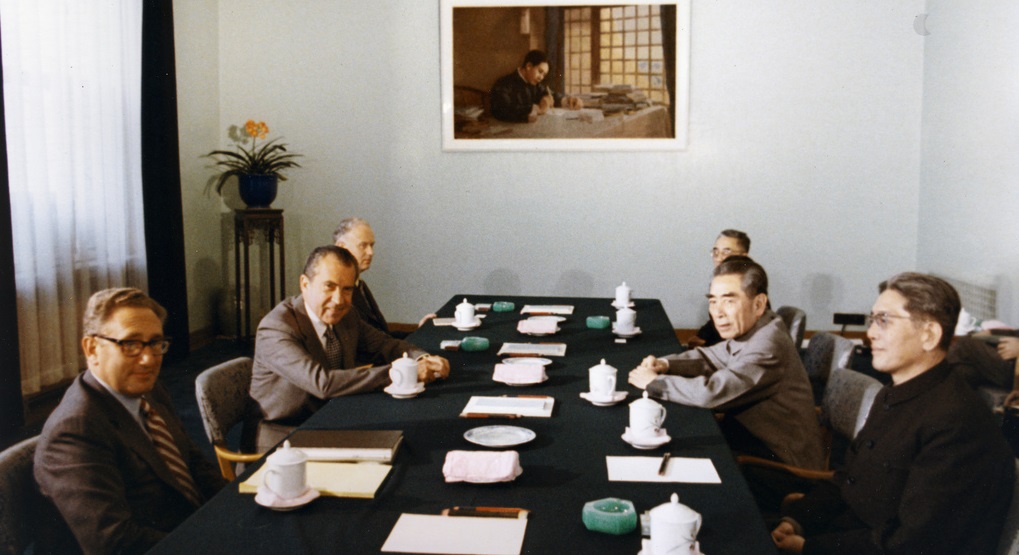
Mar 01 , 2017
Today marks the 45th anniversary of the Shanghai Communique, which brought unprecedented peace and development to Asia.
Nov 10 , 2012
From pivots to rebalancing, Steve Orlins explains that the United State has lost “Innumerable opportunities” to coordinate with China. Now, as both nations appoint new leaders days apart from one another, Orlins describes why the Obama administration should support China’s reformers.
Mar 02 , 2012
As we reflect on the 40th anniversary of President Nixon’s trip to China, and Secretary Kissinger’s secret trip a year earlier that paved the way for this dip
Stephen
Orlins: A life defined, enriched by China
Updated: 2014-03-28 13:18
By Zhang Yuwei in New York (China Daily USA)
http://usa.chinadaily.com.cn/2014-03/28/content_17388709.htm
Stephen A. Orlins was one of the first few Americans who traveled to China shortly after the two countries established diplomatic ties in 1979. Since then his visits became more and more frequent and China - as he puts it - came to "define" his life.
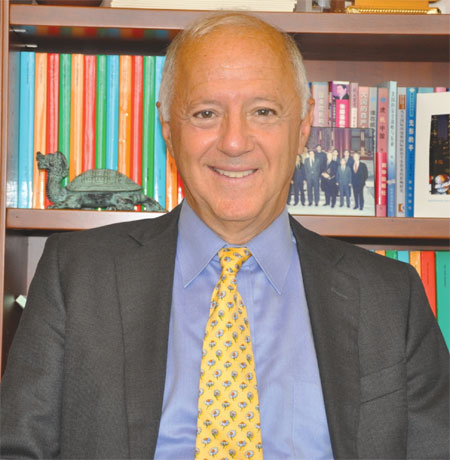 Stephen A Orlins is president of the National Committee on US-China Relations in New York. Zhang Yuwei / China Daily |
Orlins, 63, a former diplomat, lawyer, banker and investor, now leads New York-based National Committee on US-China Relations, a non-profit organization that encourages understanding of China and the US.
"It was my dream at the very beginning to make a contribution to society and to the people, and to the (US-China) relationship," said Orlins, who has been president of the committee since 2005.
Throughout the year, Orlins helps put together a number of programs that promote a "constructive relationship" between the world's two largest economies, work that he calls "very rewarding".
His route to China started when Orlins signed up for Mandarin in 1970 at Harvard College. He never imaged that decision would impact the rest of his life and lead him to becoming one of the most reputable China hands in the US today.
Recalling his motivation to study Chinese back then, Orlins said it was mostly a "result of America's interest in Asia, which was mostly a product of the war in Vietnam".
"We needed Americans who would be able to understand Asia by understanding China and Chinese," he added.
Most of Orlins' career has had something to do with China. In the '70s, after receiving his law degree at Harvard, Orlins served on the legal team at the US Department of State that helped establish diplomatic relations with China.From the mid '80s to the early '90s, he served as a managing director at Lehman Brothers in Hong Kong.
In 1979, Orlins moved to China and worked for the Beijing municipal government to teach contract law - a year after China started its economic reforms - where he interacted with mid-level government officials, some of whom he is still friends with today.
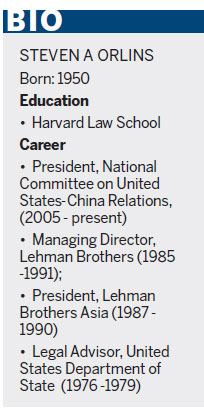
Orlins was the Democrat nominee for the US Congress from New York's Third Congressional District in 1992, losing by "very little", he recalled, several thousand out of some 300,000 votes. After that he went into private equity and worked on deals throughout Asia.
"As I look back on my entire career, they were some of the most interesting, exciting and important things that I've ever done," said Orlins, who likes to compare what he saw when he first visited China in the past decades to what he sees today.
Every time he passes through Shenzhen, bordering Hong Kong to the south, Orlins thinks of his first visit there in the early '80s when local officials showed him the rice paddies in the city, which they planned to develop into a "special economic zone".
"I just thought, 'it's not possible'," recalled Orlins, "but here today Shenzhen is now a first-world city."
"The change has been enormous," he said. "I could have never imagined this development."
The China expert follows China events closely wherever he is. Some must-watch events for Orlins include the two sessions - the annual sessions of the National People's Congress, China's top legislative body, and its advisory body, the Chinese People's Political Consultative Conference.
"What they are talking about in all these different issues will determine the future of China and the future of US-China relations," he noted.
Orlins' commitment to fostering a constructive relationship between the US and China has a deep personal connection - his adopted Chinese daughter, now 26 years old, who lives in Beijing.
"If I had not studied Chinese, I can't think of what the other path I would have been on is," said Orlins. "It's defined where I lived, it's defined my views of the world, and it's defined who my friends are."
Orlins has also witnessed transformations in the lives of his Chinese friends. "They've done it through hard work, through fine education and through a vision of what China will become," he said.
Orlins' work at the 47-year-old NCUSCR includes creating programs that bring together experts from both countries to interact and educate Americans and Chinese about each other's countries. He recently accompanied a delegation of five US Congressmen to China after the Two Sessions. The purpose, as he puts it, was to provide an opportunity for the US politicians to understand China and interact with Chinese officials.
"China affects the lives of every single American because of trade issues and the fact that China's role in the world is so much more important than it was then," he said.
Despite occasional short-term conflicts between the two largest economies, Orlins said the increasing bilateral investment and people-to-people exchanges will help enhance understanding and reduce mistrust.
"In the long term, people are driven by feeding their families, educating their children, providing a better place for their children," said Orlins. "I believe that the economic relationship is the defining part of the US-China relationship."
His observations of the major events in China make him optimistic about the Chinese leadership led by President Xi Jinping and the reform agenda set out in the past two sessions.
"If the reforms that have been talked about at the two sessions and the Five-Year-Plan are implemented over the next five years, the economic relationship is going to become closer and stronger and it's going to pull the two countries together," he said.
The question of "what's next" for China concerns many China watchers, as slower growth - around 7.5 percent - is predicted for the world's No 2 economy.
Orlins said the Chinese government has made "strong" decisions on economic policies and the new leadership is "quite clear on what needs to be done".And financial reforms such as liberalization of banking, he noted, is an important part of economic reform in China.
"It's not easy to do. The question really is: how you sequence it," he said.
yuweizhang@chinadailyusa.com
(China Daily USA 03/28/2014 page10)




